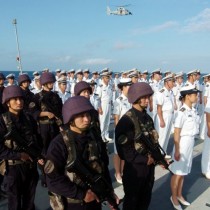
China aims for 'world-class army' by 2050
With purchases and construction of fighter jets, ships and hi-tech weaponry, China's military budget has grown steadily for 30 years, but remains three times smaller than that of the United States. Now, Beijing wants to catch up.
"We should strive to fully transform the people's armed forces into a world-class military by the mid-21st century," Xi told 2,300 delegates of the Chinese Communist Party, which he heads and which controls the army.
The comments, made during the party's twice-a-decade congress, were aimed in part at domestic nationalists, but also intended to show other countries "China's desire to be strong economically as well as militarily," said James Char, a military analyst at Singapore's Nanyang Technological University.
During China's so-called Century of Humiliation, starting around the mid-19th century, the country lost almost every war it fought, and was often forced to give major concessions in subsequent treaties.
But Xi's call to build a military that can "fight and win" has alarmed China's neighbors, several of whom are embroiled in tense border disputes with the superpower.
This summer India and China engaged in a bitter, weeks-long military confrontation over a disputed area in the Himalayas. Japan regularly faces off with Chinese maritime patrols close to the Senkaku islands, which are called the Diaoyu in Mandarin and claimed by Beijing. And Beijing asserts sovereignty over almost the entire South China Sea, despite rival claims from countries including Vietnam, the Philippines and Malaysia.
Beijing has reclaimed islands it controls in the sea in order to cement its claims and installed military aircraft and missile systems on them, causing tensions to spiral in recent years.
"Chinese activities are a security concern for the region encompassing Japan and for the international community," said a recent Japanese defense report.
China's military expenditure in 2016 was an estimated $215 billion, according to the Stockholm International Peace Research Institute, putting it in first place in Asia, well ahead of India ($56 billion), Japan ($46 billion) and South Korea ($37 billion).
The country has not participated in any conflict since a month-long border war against Vietnam in 1979 that killed tens of thousands of people and a 1988 skirmish, also with Hanoi, over the Spratly Islands in the South China Sea, that left 64 dead. But it has been busy boosting its military activities abroad.
This year, Beijing opened its first foreign military base, in Djibouti. Since 2008, its navy has participated in anti-piracy operations off the coast of Somalia and in the Gulf of Aden. The country is the largest contributor to United Nations peacekeeping operations among the permanent members of the security council, with some 2,500 soldiers and military experts deployed. The moves are all part of a larger, decades-long effort to modernize the country's military, which had become riddled with corruption, incompetence and waste.
DAILY-SABAH
Leave a comment
| Copyright © 2009 - 2024 Sunatimes News Agency All Rights Reserved. |
| Home | About Us | Diinta | Reports | Latest News | Featured Items | Articles | Suna Radio | Suna TV | Contact Us |
 0
0 









China aims for 'world-class army' by 2050
Chinese President Xi Jinping's pledge to build a "world-class army" by 2050 is making his neighbors nervous, but analysts say Beijing's military ambitions do not constitute a strategic threat, for now.